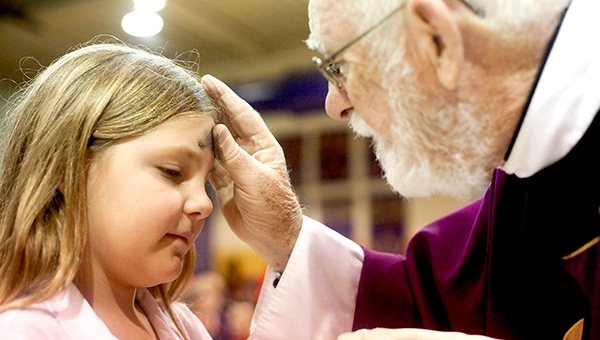 Spiritual practices come and go in the Church. They rise in popularity and then some fade away into relative obscurity. Many, such as fasting (giving up something) come from the Bible itself. Others grew up in the church because they filled a need. Few people sitting on pillars these days (see: Simeon Stylites).
Spiritual practices come and go in the Church. They rise in popularity and then some fade away into relative obscurity. Many, such as fasting (giving up something) come from the Bible itself. Others grew up in the church because they filled a need. Few people sitting on pillars these days (see: Simeon Stylites).
Not so long ago, many Protestants considered Ash Wednesday and the imposition of ashes to be "too Catholic" or "ritualistic," but now, many Protestants have embraced the practice. The same is true with the practice of "giving up" something for Lent. I personally think these have been good developments for Protestants. We need to get out of our "heads" and into our hearts a little more. After 500 years, it's okay to embrace a little more symbolism and ritual, especially because that's how we're wired (by God I would argue). Ashes and other rituals of remembrance (such as Communion and giving up meat) are what Saint Augustine coined, "outward signs of an inward grace."
In the past 50 years of children's ministry history, we've gone from "doing almost nothing" special for Lent to encouraging children to "give up" something for Lent, and then to the newer call to "give up giving up" for Lent in favor of "doing something to help others." What was once viewed as a personal Lenten journey to the Cross has been turned by some leaders into a time for the practice of social justice rather than personal spiritual development. But the two don't need to be mutually exclusive. Jesus himself used prayer and contemplation to fuel his outreach.
Some have "given up on giving up" because they think it's too self-centered or too easily interpreted as "doing it to please God." They prefer an outward-facing spirituality, not an inward one.
But it's a false dichotomy. We do "please God" when we engage in private acts of devotion and see to the needs of others. One often leads to the other!
In fact, you could argue that Lent is a time to get out of your comfort zone and consider the very thing your own spiritual development is lacking. Taking a walk into your own personal wilderness, so to speak, or adopting a practice that will take you OUT of your "spiritual silo."
So if you're all about "doing" it may be time to give that up and focus on contemplative practices such as "being still," reading scripture, and "listening." And if you enjoy contemplative practices, maybe it's time to go "do" some charitable acts along the lines of "doing justice."
With children, simple ritual practices are a great way to INTRODUCE them to the stories and concepts of Lent and Holy Week. Ritual practices give them an interactive way that's both attractive and memorable. And rituals that children see others participating in give children that important sense of solidarity that is essential to church fellowship.
Ashes only teach part of the story.
How about organizing a "hike in the local wilderness" or a trail of story stations around your church property.
How about creating a footwashing or handwashing ritual as both a spiritual practice and opportunity to collect hygiene products for those in need?

"Giving up" should be connected to "give to others"
For example...
- You can give up meat for dinner, and use the savings to feed the hungry.
- You can give up candy, and work on making life sweeter for someone else.
- You can give up video games to make time for playing with your family.
- You can DVR your favorite TV show and watch a Bible movie instead, (How many does your church own that are sitting around un-watched this Lent?)
- You can fast your Wednesday lunch and then "break fast" with a simple meal that evening at church where you study Isaiah's call for "fasts of justice."
- And why not find a "pillar" to go sit on this Lent like old Simeon Stylites? Where's an "out of the way place" you could retreat to for some scripture and meditation? What issue could you help "raise up" a little higher for others to take notice of?
The key to "going without" is that we go without something that's TANGIBLE. While I like the idea of giving up things like "giving up saying bad words today" -- that puts us back in our heads again, whereas FASTING is about doing without the temptingly tangible. In the story of Jesus being tempted in the wilderness, Evil didn't tempt him with ideas, it tempted Jesus with the tangible. Evil offered him bread, took him to the Temple precipice, and showed him all the kingdoms. So especially with kids, let's keep Lent "hands-on" (tangible) just like we believe our teaching should be.
Keep in mind that many Christians do not have good prayer and contemplative practices, and children will have practically NONE. So they will need some guidance, hands-on helps, and reminders. And while such things can be encouraged on Sunday, fortunately for us we live in an age when every parent and youth seems to own a cellphone that can receive images and text message reminders.
What will you give up today?
What will you give away today?
Who will you give to today?
What will you give time for today?
What spiritual practice will take you out of your comfort zone?
The possibilities are so rich that Lent's annual 40 Days are perhaps the year's greatest gift to teachers.
You could theme the different weeks of Lent along the lines of:
- Give Up week
- Give Away week
- Give To Someone week
- Give to Yourself week
Kids could create a "Lent Calendar" and put suggestions in it --to be opened each week (yes, sort of like an Advent Calendar). Or these "weeks" could be the subject of the children's sermon each week.
Looking forward to your response and ideas.
-Neil










